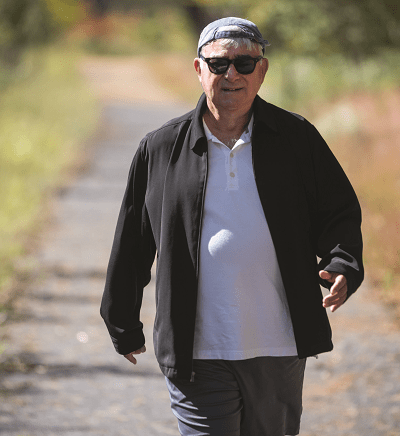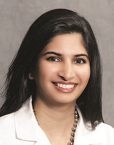"[My snoring] really created a strain in my marriage."

Alan Pavon used to “serenade” his wife, Shelley, every night. Unfortunately, Alan’s nocturnal performances sounded more like a hacksaw slowly working its way through a log rather than a love song. His relentless snoring was taking a toll.
“It really created a strain in our marriage,” says Alan, 71, of Hillsborough.

While snoring is annoying for bed partners, it can also be a sign of sleep apnea, a serious medical disorder that affects about 25 million Americans.
Alan sought treatment from Priyanka Yadav, DO, a specialist in sleep medicine at Robert Wood Johnson University Hospital (RWJUH) Somerset’s Comprehensive Sleep Center. Today, quiet has been restored in the Pavon household, and Alan’s quality of life and overall health have improved.
A Dangerous Disorder
Sleep apnea occurs when a person’s airway becomes blocked while he or she sleeps. It can be caused by excess fat in the neck, large tonsils and a tongue that flops backward while you sleep. A person may snore and stop breathing briefly.
“If this occurs five or more times an hour, then you have sleep apnea,” says Dr. Yadav. In severe cases, patients may stop breathing up to 60 times an hour.
Frequent episodes of apnea can have serious consequences.
For starters, suddenly losing oxygen leaves a person gasping for air, causing him or her to awaken. While these arousals are usually brief, they can rob you of sound sleep and make you feel lethargic and drowsy the next day. Alan, a former marketing executive, estimates he’d only slept about three hours a night for years.
“I’d find myself dozing off while driving home from work on Route 78, and I’d have to pull over to close my eyes for a minute or two,” he recalls.
If falling asleep at the wheel isn’t scary enough, sleep apnea has been linked to many medical conditions.
Each episode reduces your blood level of oxygen, says Dr. Yadav.
“If you’re not getting enough oxygen, it creates inflammation, which can lead to a buildup of plaque in the arteries and increases the risk for heart disease and strokes.”
People with sleep apnea are also more likely to be overweight and develop high blood pressure, an irregular heartbeat, type 2 diabetes, and other conditions.
A Life-Changing Treatment
If you’re overweight, shedding some pounds can reduce apnea episodes by up to 50 percent, says Dr. Yadav.
The standard medical treatment for moderate-to-severe sleep apnea is a continuous positive airway pressure (CPAP) machine. These devices take pressurized air and deliver it to the back of the airway, where the obstruction occurs, through a tube connected to a mask worn during sleep.
Alan knew about CPAP machines but was reluctant to try one because he thought the mask would be uncomfortable. Then he discovered that a friend had overcome sleep apnea by using CPAP. When Shelley heard this news, she exclaimed, “You’re getting that!”
Alan had a sleep study to confirm the diagnosis. The Comprehensive Sleep Center offers overnight sleep studies at the hospital as well as home testing. Alan had a home test, in which a monitor records a person’s blood oxygen levels, pulse, sleep position, and breathing interruptions.
Dr. Yadav determined that Alan would be a good candidate for CPAP since he had severe sleep apnea. The Comprehensive Sleep Center’s respiratory therapists work with patients to select the right machine and ensure that the mask fits comfortably. People with less severe cases may use a mandibular advancement device, which moves the lower jaw forward and locks it in place. “That way, when you sleep on your back, your airway is not compressed,” says Dr. Yadav.
Overcoming sleep apnea has been “life-changing,” says Alan, who is getting a good night’s sleep and feels more alert during the day.
He adjusted to wearing a mask overnight more quickly than he had anticipated. And while the CPAP machine makes a low sound, like a fan, Shelley has gotten used to it.
“It’s a lot better than my former marketing snoring,” says Alan.
For more information about our Comprehensive Sleep Center or to schedule an appointment, call (908) 927-8795.